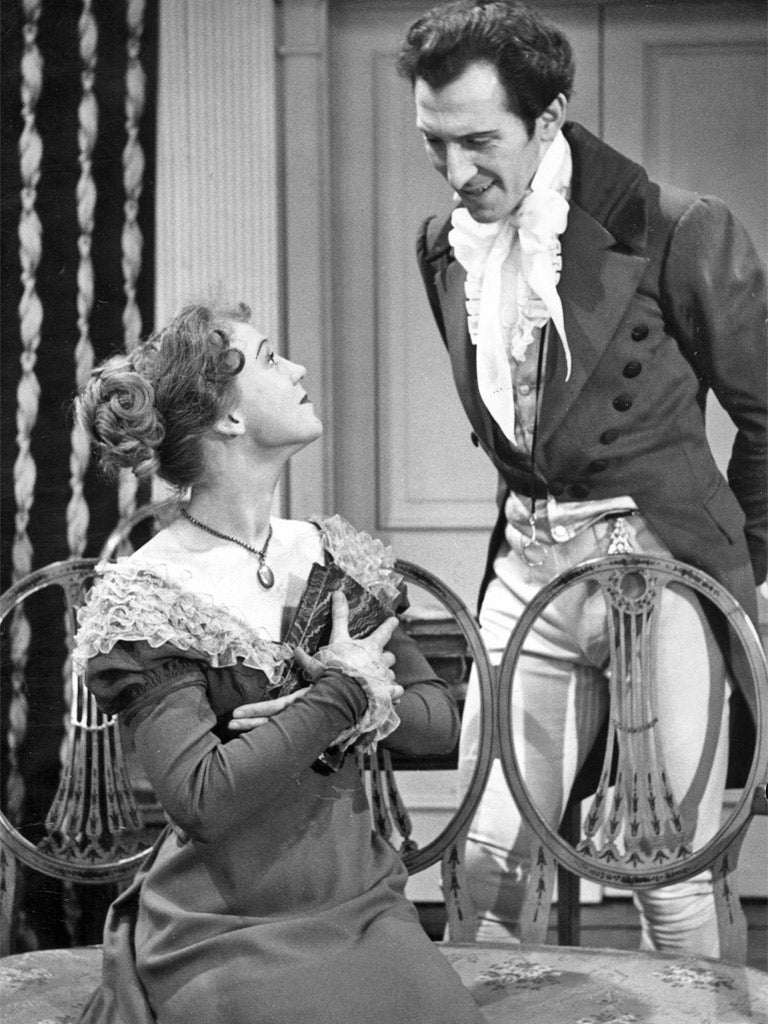Daphne Slater: She played the first television Jane Eyre

Daphne Slater was just 19 when the critics praised her Juliet at the Shakespeare Memorial Theatre, Stratford-on-Avon.
They reacted far more favourably to Slater as a new actress than to the also new and young director of Romeo and Juliet, Peter Brook.
Slater's talents were later transposed to BBC television, as it began to dramatise the English literary canon in serial form. In 1952 she played Elizabeth Bennet in Pride and Prejudice, with Peter Cushing as Mr Darcy (he was then considered as good casting for a dashing gentleman). Four years later, in another serialisation, she became the small screen's first Jane Eyre, in a performance brimming with passion, with Stanley Baker playing Mr Rochester.
She played Prue Sarn in Precious Bane (1957), Portia in Julius Caesar (1959) and Anne Elliot in Persuasion (1960). After retreating to small character parts on television during the 1960s, she proved a commanding presence when she finally returned to period drama as Mary Tudor in Elizabeth R (1971), well able to stand up to Glenda Jackson as her sister.
Born in London, where her father worked for the Ministry of Food, Slater was educated at Haberdashers' Aske's School for Girls, before she won a scholarship to Rada. She was among a the students filmed for I Want to Be an Actor (1946), produced by Michael Barry, which is thought to be the first ever drama-documentary to be shown on television.
On leaving Rada with a gold medal, Slater seemed on course for stardom. The film director Herbert Wilcox offered her an £8,000 film contract and an immediate leading role, with Michael Wilding and Anna Neagle, in The Courtneys of Curzon Street, which became the most popular film at the British box office in 1947.
Just before its cinema release, she joined the Shakespeare Memorial Theatre company, in which she eventually played Olivia in Twelfth Night and Miranda in The Tempest. Slater joined because Honor Blackman, then also 19, could not accept Peter Brook's offer to play Juliet, since she had signed a film contract just a day before. Slater was released from her screen contract with Wilcox when it became clear that she was likely to have a major stage career.
Slater played Harriet Smith in a television adaptation of Emma (1948), directed by Michael Barry, who subsequently became head of drama at the BBC, where Slater came to have regular starring roles for a few years. Hers was a very modern acting career, alternating between television and the London stage: at the Arts Theatre in The Cherry Orchard (1948), Tartuffe (1948) and the original production of The Lady's Not for Burning (1949). This was followed by Moliere's The Gay Invalid (Le Malade Imaginaire, Garrick Theatre, 1951), and she played Cordelia in King Lear (Old Vic Theatre, 1952).
Her career then took another direction. In 1948, she had married John Harrison, a fellow actor at Stratford, and four years later, when he became director of the old Nottingham Playhouse, she turned her back on the London stage and continued her classical career in Nottingham, earning the repertory theatre's standard £12 a week for constantly changing parts: this left no time for television productions, then mostly transmitted live.
"I have old-fashioned ideas that the husband has to be the breadwinner," she said at the time, revealing her modest ambitions. "So it wouldn't do at all if I were more successful than he is."
Slater began to refuse theatre work while bringing up their children. Harrison became the artistic director of Birmingham Repertory Theatre in 1962, and the marriage ended in divorce in 1964, although they remained friends. She returned to minor character roles on television, in plays and series such as Callan (1969) and the sitcom Our Man at St Mark's (1966), as well as being an early Jackanory storyteller (1967).
In 1970, she married Frederick Kolmar, an Austrian businessman. Five years later, Slater retired at 47 and the couple moved to Germany, then Switzerland. After Kolmar's death, she returned to Britain.
Daphne Helen Slater, actress: born London 3 March 1928; married 1948 John Harrison (divorced 1964; two sons), 1970 Frederick Kolmar (deceased); died 4 October 2012.
Join our commenting forum
Join thought-provoking conversations, follow other Independent readers and see their replies
Comments
Bookmark popover
Removed from bookmarks